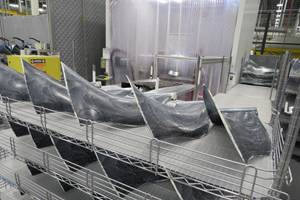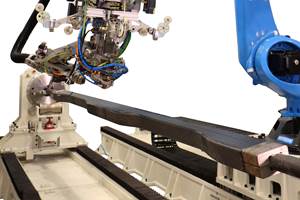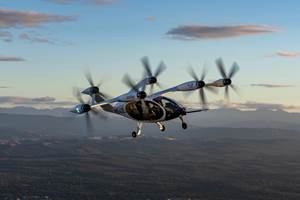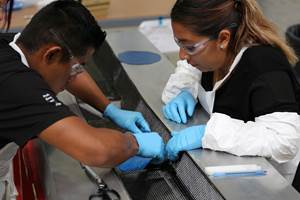Carbures: Conquering the world for composites
This global Tier 2 supplier produced 39,322 parts for Airbus in 2015, has sold seven RMCP machines to China capable of 40,000-75,000 composite auto parts/yr and is completing a study on opportunities for composites in oil and gas applications in Mexico. What next?
Share
Read Next
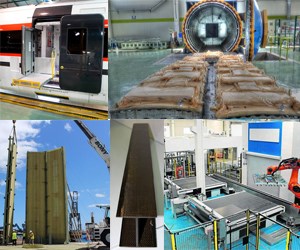
Carbures is a Tier 2 supplier of composite parts for railcars (upper left), aircraft (upper right), infrastructure (lower left) and automotive (lower right).
Proficient in hand layup, prepreg and autoclave processing, Carbures has also developed RTM technology (I-beam lower center) and the Rapid Multi-injection Composite Process (RMCP, lower right), capable of making 40,000-75,000 parts/yr. SOURCE: Carbures.
Over a Decade of Global Growth
Carbures (El Puerto de Santa María, Cadiz, Spain and Greenville, SC, US) began in 1999 as a spinoff from the University of Cadiz’ School of Chemistry, with two employees working on a composites part manufacturing project for Construcciones Aeronáuticas SA (CASA, Getafe and Cadiz, Spain), the original third partner in Airbus Industrie, now known as Airbus Group Spain. The spinoff company established a factory in 2006 in Jerez, Spain and merged with Atlantica Composites to form Carbures in 2011. That same year, Carbures USA was launched with a facility at the South Carolina Technology & Aviation Center (SCTAC) in Greenville, SC. The company also formed the joint venture Harbin Carbures Guanglian Composite Aeronautic Co. to produce composite parts for Airbus China.
Carbures has grown organically through its relationship with Airbus and also through acquisitions in aerospace, automotive, rail and infrastructure. SOURCE: CW and Carbures.
Airbus and Airbus Military are Carbures’ main aerospace customers, along with Aernnova (Miñano Mayor, Spain), Aciturri (Miranda de Ebro, Spain), Alestis Aerospace (Seville, Spain) and other Tier 1 suppliers. (See “The Plane in Spain” for more info on the Spanish aerocomposites landscape.) Much of Carbures’ growth has been driven by its relationship with Airbus and ability to develop composites solutions and meet production demands. After going public in 2012, Carbures acquired Composystem (Illescas, Spain) and Militärtecnologie Dienst und Überwachung (MDU, Seville) in 2013. Composystem, a key supplier for Toulouse-based Aerolia, provided contracts to build smaller carbon fiber parts for the Airbus A380, A320 and A350 XWB programs. MDU, a 250-person engineering firm specializing in aerospace, defense and military marine, supports Airbus Military, including A400M contracts, and provided Carbures with connections into non-aerospace military markets.
Carbures would repeat this approach — entry into a new market via engineering companies — several times in the following years..

Carbures employs 950 personnel, operating from 15 locations globally.
SOURCE: CW and Carbures.
Carbures also acquired Fiberdyne (Seattle, WA, US) in 2013, followed in 2014 by Mapro (Barcelona, Spain), which designs and produces automated turnkey systems for fabricating and testing components in the automotive and transportation markets. With this purchase came locations in Poland (Tychy), China (Shanghai), Mexico (Querétaro) and the US (Saginaw, MI), as well as an entry into the railcar market through Mapro’s engineering division, MP Productividad.
The company’s final acquisitions in 2014 focused on automotive with AxCEP (Munich, Germany) and Technical and Racing Composites (TRC, Barcelona, Spain), and also on infrastructure, via the Mexican engineering firm La Sociedad Grupo Profesional Planeación y Proyect (PYPSA, Ciudad de México and Poza Rica, Veracruz), which provides services for a wide range of industries, including construction and oil & gas.
In 2015, Carbures consolidated its facilities, which included closing Fiberdyne and operating all programs in a larger, 3716 m2 site in Greenville.

|

|

|

|
Carbures is accustomed to meeting full-rate aerospace production, with 20,000 m2 of manufacturing space, (left to right) 2500 m2 of clean room capacity, automated prepreg cutting and kitting, automated nondestructive testing (NDT) and tool maintenance, as well as 6 latest-generation autoclaves. SOURCE: Carbures.
Aerospace Production Ramping
It also achieved record aerospace production in 2015, delivering 39,322 composite parts, an 11% increase over 2014. The Illescas site led that surge, with 3 new aircraft parts manufacturing programs, bringing its total to 27, while the Jerez de la Frontera site followed closely with 4 new programs, to total 18.
Carbures makes composite parts for the Airbus A320, A320NEO, A330, A340, A350 and A380, as well as the A400M military airlifter, the C295 tactical transport aircraft, and the A330 Multi Role Tanker Transport (MRTT), an aerial refuelling tanker based on the civilian model.

|

|

|

|
Carbures has developed the Rapid Multi-injection Composite Process (RMCP), an automated production line reportedly able to produce 40,000-75,000 parts per year. The company also makes structural automotive parts using prepreg and RTM (right). SOURCE: Carbures.
From Aero to Automotive
“The difference in Carbures versus most Tier 2 suppliers is that we were created from composite chemistry expertise,” explains Carbures executive chairman Rafael Contreras. He says that the company’s growth in aerospace production comes from its knowledge of composite materials and processing, but Carbures has also invested in automation, for example, high-speed ultrasonic testing (UT) systems from Tecnatom (San Sebastian de Los Reyes, Spain) and high-speed machining like the BR25 system from European Portal Milling Machine (EPMM, Seville, Spain).
Now, Carbures has developed the patented Rapid Multi-injection Composite Process (RMCP) for large-volume (e.g., 40,000-75,000 parts/yr) production for composites for automotive and aerospace applications. The company announced in 2014 that it had sold 7 RMCP production lines to the Chinese firm Shenyang Hengrui (Shenyang).
Note this video has no sound.
“This is why we bought AxCEP,” explains Carbures USA engineering manager Sana Elyas. “They not only have desirable engineering expertise, but also good connections to the German automotive OEMs and Tier 1 suppliers.” She adds that Carbures’ acquisition of TRC in Barcelona was also strategic. “It has a focus on luxury sports cars and motorcycles, which was a good fit as we began efforts to enter the market,” says Elyas. “Mapro too, has already provided a great benefit in developing and commercializing RMCP. Its Poland, Mexico and US sites bring us design, build, automation and testing capabilities plus relationships to regional supply chains.”
Carbures announced in Oct 2015 that it will partner with forged wheel producer 2elle-engineering (Trebaseleghe, Italy) to manufacture a hybrid aluminum-CFRP wheel cutting weight 30% weight vs. traditional metal wheels and an all-carbon wheel, with a weight reduction of 45%. The companies have set a goal of producing 30,000 wheels/yr by 2017.
MPP currently makes various assemblies for railcars, like these lifts for disabled passenger access. Carbures’ aim is to design assemblies that are more composites-intensive. SOURCE: Carbures.
Systems and Engineering Entry to Markets
Mapro also provided an entry for Carbures into the railcar market via its engineering division MP Productividad. “MPP was focusing on the assembly of doors and other modules which included FRP parts,” says Elyas. “We now focus on composite parts and assemblies.”
Carbures built and assembled multiple glass fiber/epoxy shell sections for two 12m-diameter by 13.3m-tall caissons used to extend a cruise ship berthing dock in the Canary Islands.
SOURCE: Carbures.
In infrastructure, Carbures helped global infrastructure and renewable energy company Acciona (Madrid, Spain) to demonstrate its patented system substituting composites for concrete in the construction of dikes, docks and berths for ports. This glass fiber reinforced plastic (GFRP) caisson technology was used in the construction of two mooring dolphins as part of the Puerto del Rosario’s (Fuerteventura, Canary Islands) 2103-2014 project to expand a cruise ship dock. Carbures fabricated glass fiber-reinforced epoxy composite shell sections at its Jerez facility and transported them by ship to the port. The sections were assembled to form two 12m-diameter and 13.3m-high caissons, which were installed onto subsea platforms using a lightweight crane, filled with granular aggregates and topped with concrete slabs, to which large-ship mooring bollards were affixed. The composite caissons reduced CO2 emissions by 75% and occupied only 625 m2 of the surface of the harbor for 3 months while being cost-competitive to the concrete block alternative, which would have required 6,000 m2 of bulk container storage in the harbor for 8 months.
Carbures sees enormous potential for this and other composites technologies in construction, infrastructure and oil & gas. Indeed, in 2015 it was awarded a 27-month engineering service contract worth 11 million euros by Pemex Exploration and Production (Mexico City, Mexico) to develop composite structures for oil infrastructure aimed at reducing maintenance and operating costs in the North Sea and southern regions of Mexico.
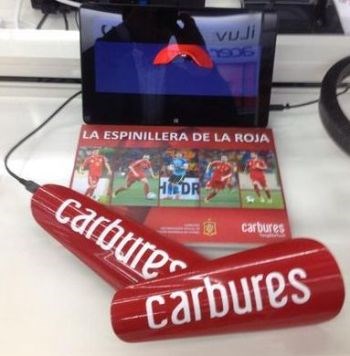
Carbures has supplied CFRP shin guards to the Spanish national football team, complete with built-in sensors. SOURCE: rankia.com.
What Next?
Carbures has set an impressive strategy in place, forecasting growth in its aerospace and automotive business and continuing to invest and develop projects in diversified markets. It has even produced carbon fiber composite shin guards for the Spanish national football team, complete with built-in sensors to record and transmit real-time data on each impact received during every game. The goal is to use the data to customize shin guards per player and also to help guide coaching decisions.
Carbures' belief in the potential of composites in unwavering. Contreras summarizes: “Our vision: get into the market, improve it, increase it, and grow composites overall.”
Related Content
Plant tour: Albany Engineered Composites, Rochester, N.H., U.S.
Efficient, high-quality, well-controlled composites manufacturing at volume is the mantra for this 3D weaving specialist.
Read MoreMFFD thermoplastic floor beams — OOA consolidation for next-gen TPC aerostructures
GKN Fokker and Mikrosam develop AFP for the Multifunctional Fuselage Demonstrator’s floor beams and OOA consolidation of 6-meter spars for TPC rudders, elevators and tails.
Read MorePlant tour: Joby Aviation, Marina, Calif., U.S.
As the advanced air mobility market begins to take shape, market leader Joby Aviation works to industrialize composites manufacturing for its first-generation, composites-intensive, all-electric air taxi.
Read MoreComposites manufacturing for general aviation aircraft
General aviation, certified and experimental, has increasingly embraced composites over the decades, a path further driven by leveraged innovation in materials and processes and the evolving AAM market.
Read MoreRead Next
“Structured air” TPS safeguards composite structures
Powered by an 85% air/15% pure polyimide aerogel, Blueshift’s novel material system protects structures during transient thermal events from -200°C to beyond 2400°C for rockets, battery boxes and more.
Read MorePlant tour: Daher Shap’in TechCenter and composites production plant, Saint-Aignan-de-Grandlieu, France
Co-located R&D and production advance OOA thermosets, thermoplastics, welding, recycling and digital technologies for faster processing and certification of lighter, more sustainable composites.
Read MoreAll-recycled, needle-punched nonwoven CFRP slashes carbon footprint of Formula 2 seat
Dallara and Tenowo collaborate to produce a race-ready Formula 2 seat using recycled carbon fiber, reducing CO2 emissions by 97.5% compared to virgin materials.
Read More




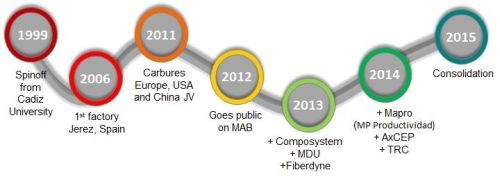



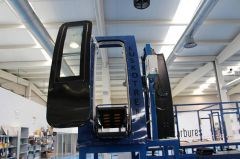
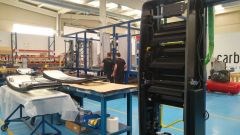
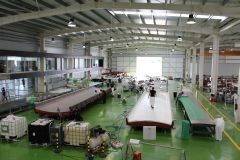
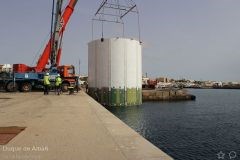
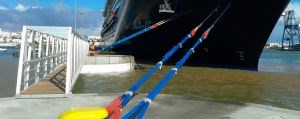






.jpg;maxWidth=300;quality=90)

